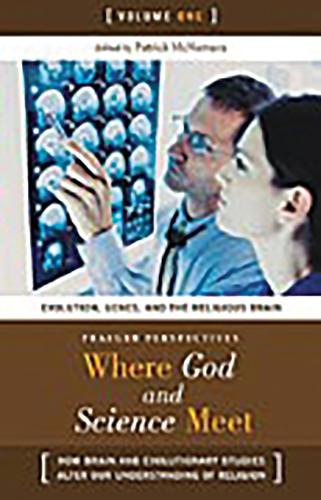
Where God and Science Meet: How Brain and Evolutionary Studies Alter Our Understanding of Religion [3 volumes]
Publishing Details
Where God and Science Meet: How Brain and Evolutionary Studies Alter Our Understanding of Religion [3 volumes]
By (Author) Patrick McNamara Ph.D.
Bloomsbury Publishing PLC
Praeger Publishers Inc
30th September 2006
United States
Classifications
General
Non Fiction
153
Winner of A 2009 selection of the International Society for Science and Religion Library P 2009
Physical Properties
Contains 3 hardbacks
928
1786g
Description
Spiritual practices, or awakenings, have an impact on brain, mind and personality. These changes are being scientifically predicted and proven. For example, studies show Buddhist priests and Franciscan nuns at the peak of religious feelings show a functional change in the lobes of their brain. Similar processes have been found in people with epilepsy, which Hippocrates called the sacred disease. New research is showing that not only does a person's brain activity change in particular areas while that person is experiencing religious epiphany, but such events can be created for some people, even self-professed atheists, by stimulating various parts of the brain. In this far-reaching and novel set, experts from across the nation and around the world present evolutionary, neuroscientific, and psychological approaches to explaining and exploring religion, including the newest findings and evidence that have spurred the fledgling field of neurotheology. It is not the goal of neurotheology to prove or disprove the existence of God, but to understand the biology of spiritual experiences. Such experiences seem to exist outside time and space - caused by the brain for some reason losing its perception of a boundary between physical body and outside world - and could help explain other intangible events, such as altered states of consciousness, possessions, alien visitations, near-death experiences and out-of-body events. Understanding them - as well as how and why these abilities evolved in the brain - could also help us understand how religion contributes to survival of the human race. Eminent contributors to this set help us answer questions including: How does religion better our brain function What is the difference between a religious person and a terrorist who kills in the name of religion Is there one site or function in the brain necessary for religious experience
Reviews
Scientists and religionists who read these volumes and attempt dialogue may begin to overcome the segregation evident in the field and reflected here. Recommended. Upper-division undergraduates through faculty/researchers. * Choice *
[P]resents the scholar and informed layperson with a fascinating glimpse into the recent evolutionary, neuroscientific, and psychological findings on religion, paying particular attention to the fledgling field of neurotheology.These volumes are written with the undergraduate clearly in mind; however, this exhaustively documented collection has enough breadth and scope to satisfy even the speacialist. In either case, it will prove a handsome addition to the shelves of any university library. * Religious Studies Review *
Authors are of varying religious persuasions or none and this provides some interesting ways for the perceptive reader to discern how belief systems influence interpretation of scientific or clinical findings.Most PSCF readers would benefit from these essays, especially those pertaining to their own expertise. * Perspectives on Science and Christian Faith *
The meeting is definitely taking place in the house of science, and the emphasis is on biological processes associated with religiousness, though religious processes associated with biologicalness are occasionally addressed for example the health benefits and risks of religiosity. Mostly psychologists, but also other scientists and a few scholars of religion, look at evolution, genes, and the religious brain in volume one. The second volume discusses the neurology of religious experience; and the third the psychology of religious experience. The volumes are paged and indexed separately. * Reference & Research Book News *
Author Bio
Patrick McNamara is Director of the Evolutionary Neurobehavior Laboratory in the Department of Neurology at Boston University School of Medicine, and the VA New England Healthcare System. He is also Assistant Professor of Neurology at the same sites. He is currently developing an evolutionary approach to problems of brain and behavior, and studying the evolution of the frontal lobes, the two mammalian sleep states (REM and NREM) and the evolution of religion in cultures. He is trained in behavioral neuorscience, neurolinguistics and brain-cognitive correlation techniques. He pioneered investigation of the role of the frontal lobes in mediation of religious experience.
